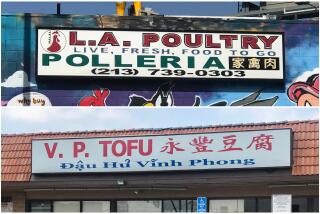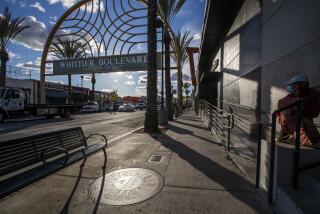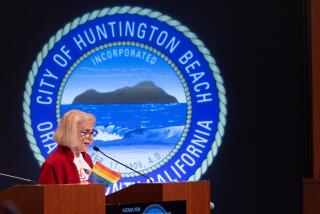Stronger Rules on English in Signs Pushed by Council
MONTEREY PARK — Responding to critics who say this city reflects too much of an Asian flavor, the City Council has approved the drafting of a proposal that would further restrict Chinese-language business signs.
The action, which directs the city attorney to draft a proposal requiring all businesses to display some form of English identification on commercial signs, will likely prove controversial in the Asian community. A similar proposal last summer was attacked by Chinese business owners as an infringement of free speech.
After a heated exchange over the extent to which commercial signs should be regulated, council members Tuesday voted unanimously for the compromise proposal calling for more English translation than required in the law adopted by the same council four months ago.
Pressured by Residents
In calling for a more restrictive sign ordinance, all five council members said they were responding to pressure from residents disillusioned over the increasing Asian character of their community. More than 40% of the city’s 60,000 residents are Asian, up from 15% in 1970. Councilman David Almada, who proposed the tougher ordinance, said a recent petition drive declaring English as the city’s official language revealed the depth of this disillusionment.
“More than 3,000 people signed that petition,” Almada said. “You’d have to be ignorant not to pay attention to that.”
Councilman Cam Briglio said: “I just want to take the heat off. . . . They’re ready to shoot us out there.”
But Councilman Monty Manibog denied that political considerations played a role in the council’s decision.
“The petition drive brought it to a head, but this was something we had to consider sooner or later,” he said. “From the beginning, people weren’t happy with the sign ordinance.”
At least one city official said the council’s action was not without irony. The official, who asked that he remain anonymous, noted that the council strongly opposed the English-as-the-official language initiative because members said it encouraged racism and would prove divisive to the community.
Rejected for Ballot
That initiative, which the city rejected as an April ballot measure on technical grounds, had only symbolic significance. A tougher sign ordinance, the official said, will have widespread economic and social impact by requiring Chinese businessmen to modify existing signs.
The current sign ordinance, which has been denounced as ineffective, requires only that a business owner display a commercial sign with the street address in Arabic numerals.
At the Tuesday workshop session held in a room at the Best Western Park hotel and attended by few residents, the City Council requested that the law be strengthened to require all businesses to identify the nature of their enterprise in generic terms, such as restaurant , bakery , dental office or preschool .
The council also asked that a new ordinance contain some sort of exception for businesses in which a logo conveys a universal meaning. For instance, they said, Shell Oil should not be forced to include “gas station” on its signs.
Once drafted by the city attorney, the proposed ordinance will go to the Planning Commission for public hearings and then return to the City Council for action. It could be made more or less restrictive at either stage.
City Atty. Richard J. Morillo said the ostensible reason for adopting a more restrictive sign law was the need for police and fire personnel to be able to readily identify the location of a business during an emergency.
Safety Rationale
Morillo urged council members to justify any new ordinance by using the safety rationale, which he said provided the city with the “compelling government interest” needed to uphold the measure on constitutional grounds.
But in requesting a more restrictive sign ordinance, all five council members instead pointed to the English-as-an-offical-language petition, how it has badly strained relations in this ethnically diverse city and the need to appear more responsive to residents critical of the Asian influx.
“Now is the time to emphasize that English is our unifying language,” Almada said. “A part of this community has become alienated.”
Frank Arcuri, a local photographer who has been one of the principal promoters of the English-as-an-official language initiative, said the council’s action was a step in the right direction but he still has serious misgivings about the measure.
‘Asian Marketplace Look’
Arcuri said the proposed ordinance would not change the “Asian marketplace look” of Monterey Park and might further confuse English-speaking shoppers by allowing smaller English signs to be placed under existing Chinese-language ones. Arcuri said if that happens, he will consider launching another petition drive to ban all foreign-language signs in the city.
“They’re putting their signs in Chinese because they think their language and customs are superior to ours,” Arcuri said. “There’s a feeling of cultural superiority. Why do you think so many Chinese businessmen open Chinese restaurants instead of American ones?”
Arcuri, clearly enjoying all the press attention accompanying his petition drive, said he never intended his convictions to divide the community.
“We have forced the City Council to confront the issues,” he said. “Before this, the council hadn’t even given lip service to our concerns. If need be, I’ll force the issue again and see how they swallow that.”
Rejected by City Clerk
Arcuri’s English-language initiative was rejected by the city clerk, on the advice of City Atty. Morillo, because it did not contain the text of what Arcuri was proposing. Arcuri said he is still undecided whether he will file a suit to force the city to approve the initiative and place it on the April ballot.
Councilwoman Lily Chen, who has long regarded the sign issue as potentially divisive and who proposed the current law, agreed to the council’s action grudgingly. She said she would have preferred a less intrusive measure such as eliminating the option of simply displaying the street address in Arabic numerals.
“I’ve studied this issue a great deal and when you start talking about the size of the signs and the proportion, you get into constitutional problems,” she said.
In a memo to the City Council, Morillo outlined eight options for strengthening the sign ordinance. These ranged from leaving the ordinance as is to prohibiting the use of non-English words or characters.
Morillo, noting that business signs were a form a commercial speech and thus subject to First Amendment protections, argued for a more cautious approach.
He said the farthest the council could go without infringing on free speech guarantees was to require businesses to display a sign identifying the nature of the business enterprise in English. That was the option the City Council chose.
More to Read
Sign up for Essential California
The most important California stories and recommendations in your inbox every morning.
You may occasionally receive promotional content from the Los Angeles Times.










